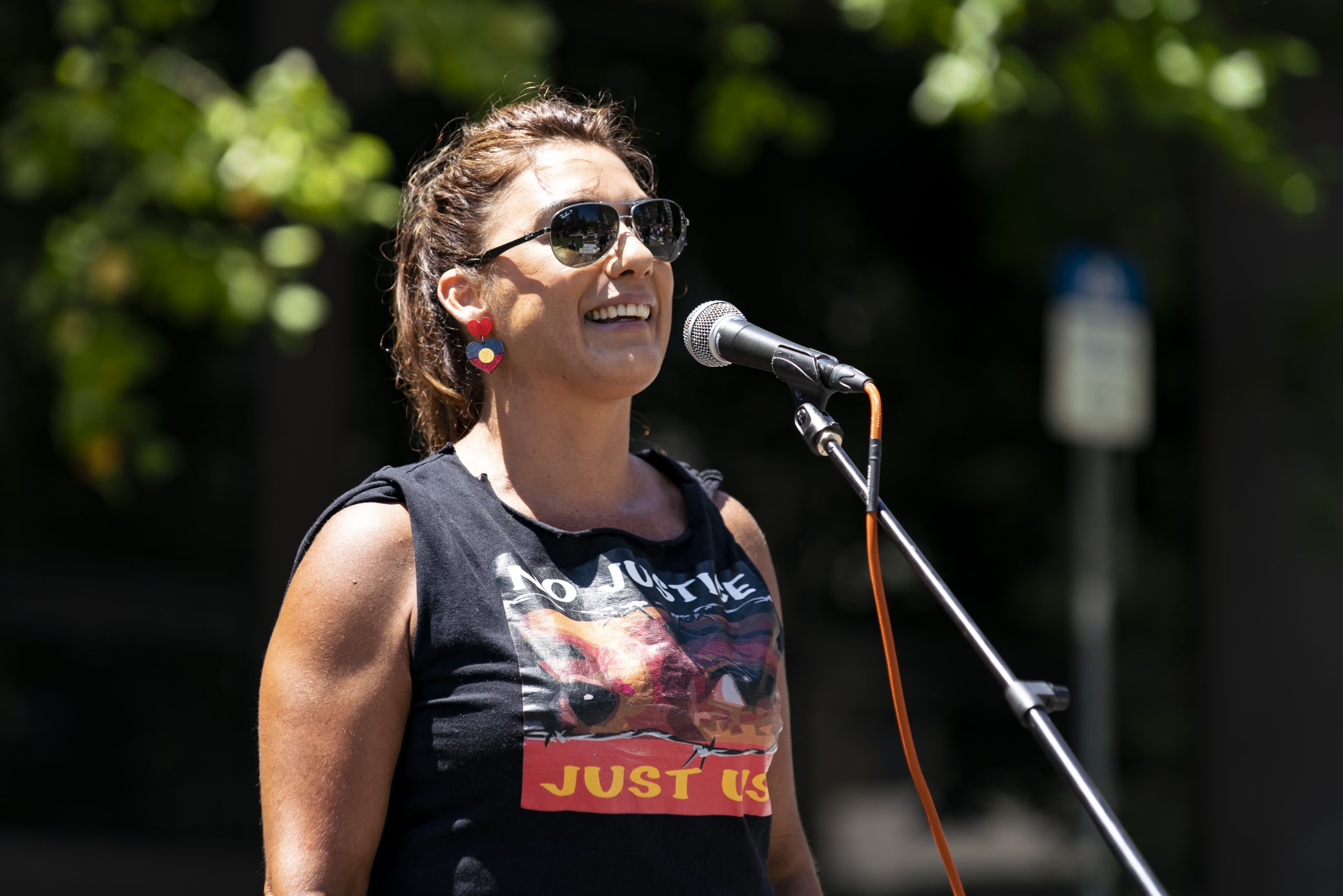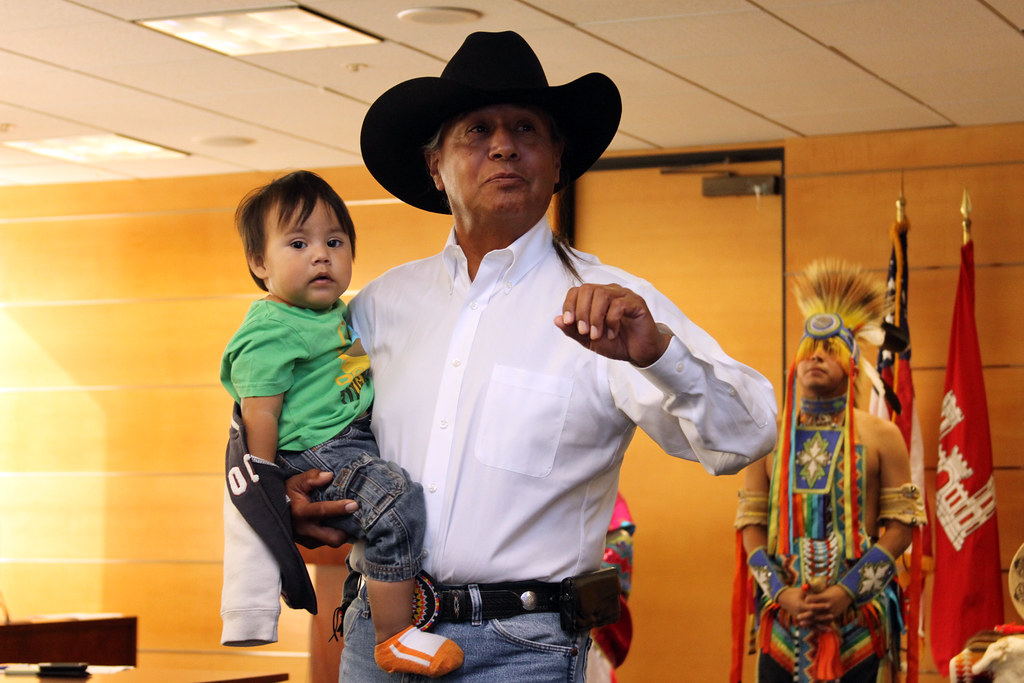Lead-up to landmark October 14th vote reveals deep schisms in society and indigenous cohesion
In the lead-up to a significant Indigenous rights in Australian Voice Referendum, racial discrimination that have plagued the campaign for weeks have escalated, coinciding with a decline in public support for the proposed constitutional “Voice to Parliament.”
Recently, a distressing video surfaced on social media, featuring an unidentified individual in a hood making racist comments targeting Indigenous communities. The video culminated with the burning of an Aboriginal flag and a Nazi salute. Notably, the video also singled out Indigenous Independent Federal Senator Lidia Thorpe, who has endured a relentless barrage of online racism and, at times, death threats since her entry into the political arena in 2020. These threats have intensified as the referendum date of October 14 approaches.

During a press conference in response to the video, Senator Thorpe, visibly upset and angered, expressed her determination to stand up against the threats. She also criticized Prime Minister Anthony Albanese, accused the police of failing to provide adequate protection, and issued a challenge to those responsible for the video, saying, “I’m ready to fight for exactly what I entered parliament for – my country, my people. I won’t back down, and I’m not afraid. So, come at me.”
Notably, Senator Thorpe, who identifies with the Djab Wurrung, Gunnai, and Gunditjmara nations, holds a controversial stance against the “Voice.” This initiative, proposed by the Labor Party, aims to establish a constitutionally enshrined Indigenous advisory body within the federal government. Instead, Senator Thorpe primarily advocates for truth-telling and treaty as part of the Blak Sovereign Movement. This movement also prioritizes addressing Indigenous deaths in custody.
Empowering hate-mongers
The disparity in support for the constitutional “Voice to Parliament” stands in stark contrast to the resounding success of the 1967 referendum on Indigenous rights. During the height of the civil rights movement, an overwhelming 90.77 percent of Australians voted in favor of including Indigenous people in the census and granting the federal government the authority to legislate for Indigenous communities.

However, this year’s referendum has deeply divided the nation, with recent polls indicating that 43 percent are in favor (“yes”), while 49 percent oppose it (“no”). In Australia, referendums involve a straightforward “yes” or “no” response to proposed constitutional amendments. A national majority exceeding 50 percent in favor is required for any amendment to pass, along with majorities in each of the country’s six states. Voting is compulsory.
Since the initiative was announced last year, public discourse has been marred by misinformation and racism, emanating from hardliners in the “no” campaign, as well as from the Liberal Party, Australia’s primary opposition party, led by Peter Dutton. The Liberal Party, which was in government until 2022, opposes the proposal.
In May of this year, Indigenous Affairs Minister Linda Burney rebuked Dutton in parliament for disseminating “misinformation and scare campaigns” and accused Voice critics of fueling division. Dutton’s campaign of misinformation prompted The Uluru Statement, the architects of the Voice, to include a fact-checker titled “Seven Peter Dutton Lies on the Voice to Parliament Corrected” on their website.
While Dutton publicly denounced the Nazi video, Rueben Berg, co-chair of the First Peoples Assembly, an Indigenous advisory group in the state of Victoria, expressed to Al Jazeera that the campaign led by the opposition leader was “emboldening the bigots and trolls.” Berg, a member of the Gunditjmara nation, reported a significant increase in racist abuse directed at First Peoples, both online and in daily life, since Dutton’s party declared their “no” campaign.
Berg noted that the First Peoples Assembly had approached Meta, the company overseeing the Facebook platform, to amend their online community safety standards, but little progress had been made in curbing the racism Indigenous individuals were enduring. He highlighted the stark contrast between online and offline behavior, where face-to-face abuse would result in ejection from a forum, while online, individuals could perpetuate “horrific racism” without consequences.
Allegations of racism have been leveled by opponents on both sides of the debate. Apart from the “swarms of aggressive and persistent racists” online, Indigenous leaders have also become embroiled in the controversy. In late August, prominent Indigenous “no” campaigner Warren Mundine accused Prime Minister Albanese of fomenting “horrible racial abuse” against those not supporting the Voice, leading some to the brink of despair. Mundine contended that the prime minister had opened the door to division and abuse.
Simultaneously, well-known Voice supporter and Indigenous spokesperson and academic Marcia Langton became a focal point in the racism debate when she asserted that claims made by the “no” campaign were “rooted in racism and ignorance.”
Impact on psychological well-being
The intensified debate on racial issues has resulted in a significant uptick in Indigenous individuals seeking mental health assistance.
Marjorie Anderson, the national manager of the Indigenous-operated mental health hotline, 13YARN, informed Al Jazeera that the organization has observed a 108 percent surge in callers reporting incidents of abuse, racism, and trauma when compared to the same timeframe in 2022. Anderson also noted that the overall volume of calls has risen, with three of 13YARN’s busiest weeks occurring within the past five weeks.
This recent increase in reports of racism and deteriorating mental health compounds an existing concern for Indigenous communities in Australia. Since the British colonization in 1788, Indigenous people from more than 300 distinct nations endured genocidal massacres and forced land dispossession. Later, punitive assimilation policies were implemented in the 20th century, including the notorious Stolen Generations, during which Indigenous children were forcibly removed from their families and cultural heritage to be indoctrinated with British values, often in abusive institutions. These policies, which persisted until the 1970s, have led to what Indigenous experts, like the Healing Foundation, define as intergenerational trauma. This trauma contributes to adverse mental health outcomes exacerbated by daily experiences of racism and perpetuated by persistent social disparities.
In 2022, the Australian Institute of Health and Welfare reported that 42 percent of surveyed Indigenous adults experienced daily racial discrimination, while over 30 percent suffered from high levels of psychological distress, more than double the rate among non-Indigenous Australians. These adverse effects on health and well-being have driven Indigenous suicide rates far above the national average. In 2020, suicide ranked as the fifth leading cause of death among Indigenous Australians, accounting for 5.5 percent of all deaths, in contrast to 1.9 percent for the general Australian population. Tragically, suicide was the primary cause of death among Indigenous children aged 5-17 in the same year.
The Black Dog Institute, an Australian mental health support organization assisting Indigenous communities, drew parallels between the mental health impacts of the Voice referendum debate and the 2017 plebiscite on same-sex marriage, which exacerbated homophobic abuse. The organization emphasized that Indigenous mental health advocates had previously warned the government about the potential detrimental effects of the Voice referendum debate.
Clinton Schultz, Director of First Nations Partnership and Strategy at the Black Dog Institute, who belongs to the Gamilaroi and Gomeroi nations, pointed out that the tone of the debate significantly influences mental health outcomes. More divisive debates lead to greater impacts, whereas respectful and inclusive discussions yield lesser consequences. Schultz highlighted that his organization was already witnessing the negative effects of the debate in Indigenous communities, such as increased psychological distress, greater demand for support, and heightened utilization of mental health services.
Earlier this year, the government allocated an additional 10 million Australian dollars ($6.37 million) to fund mental health support for Indigenous communities during the referendum campaign.
Profound disparities
The proposed “Voice to Parliament” represents the latest effort to address the entrenched inequalities and discrimination faced by Indigenous communities in Australia.
Despite the well-intentioned purpose of the referendum, Australian Race Discrimination Commissioner Chin Tan expressed concern that the discourse surrounding the vote had exacerbated issues for Indigenous individuals.
Tan lamented, “I’m disappointed that some participants in the debate have fueled racial tensions and inflicted harm upon First Nations peoples.” He emphasized that the “Voice” serves as a vital mechanism to combat the inequality, discrimination, and systemic racism experienced by Indigenous communities, by involving them in decisions affecting their lives. However, he expressed disappointment in the conduct of the campaign, saying, “I’m troubled by the fact that instances of racism have largely gone unchallenged in the public arena.” He emphasized that racism should never be accepted as a component of public discourse and called for collective learning within the community about the nature of racism and its injurious consequences.
The police have initiated an investigation into the Nazi video, and Opposition Leader Albanese has unequivocally condemned the perpetrator’s statements and actions. Albanese stated, “I’ve seen the video in question, which contains threats directed towards Senator Thorpe and the government. The use of Nazi rhetoric and comments in that video has no place in Australian political discourse.”
Following the video’s release, Lidia Thorpe sought refuge with her family member, Ringo Terrick, with police officers stationed outside the residence. Terrick, hailing from the Wurundjeri Woiwurrung nation, joined Thorpe at the press conference on Thursday. He acknowledged Thorpe’s resilience, describing her as “a very strong woman,” yet noted that she was “in a state of fear due to the extremist threats aimed at causing her harm amid the ongoing referendum discourse in the country.” Terrick further emphasized that the referendum had generated significant distress and anxiety among Indigenous people.
SOURCE: AL JAZEERA


